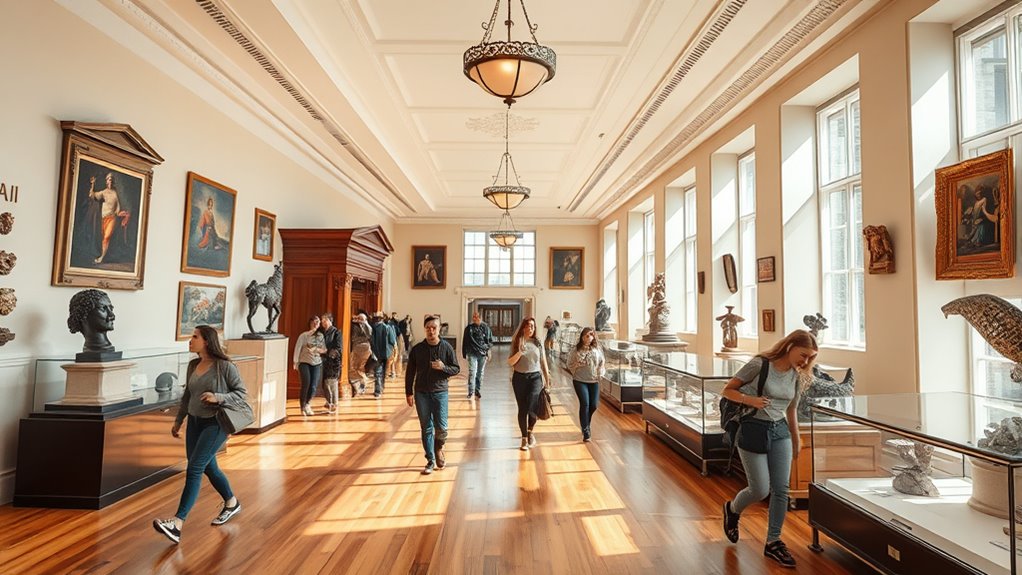Campus museums are vibrant spaces where you can explore university art collections and discover diverse artworks that reflect different cultures, eras, and styles. They serve as hubs for learning, community engagement, and art preservation, offering exhibitions, lectures, and workshops. These museums support emerging artists and highlight local heritage, making art accessible and meaningful. If you want to uncover more about how campus museums enrich education and culture, there’s much more to explore ahead.
Key Takeaways
- Campus museums showcase diverse art collections, including paintings, sculptures, and artifacts, highlighting cultural and historical significance.
- They serve as educational platforms, offering tours, workshops, and lectures to deepen understanding of art and history.
- Skilled conservators preserve artworks, ensuring the authenticity and longevity of collections for future generations.
- These museums promote community engagement by partnering with local schools and hosting special exhibitions and events.
- They support emerging artists by displaying student work and hosting contemporary installations alongside traditional pieces.

Have you ever wondered what treasures lie hidden on college campuses? Many universities boast museums filled with remarkable art collections, waiting to be explored. These campus museums are not just repositories of artwork; they are vibrant hubs of culture, learning, and community engagement. When you visit, you’ll see that art preservation plays a essential role in maintaining these collections for future generations. Skilled conservators carefully restore and protect paintings, sculptures, and artifacts, ensuring that the history and beauty of each piece endure. This dedication to art preservation preserves the integrity of the collections, allowing you to experience them as their creators intended. Additionally, many campus museums incorporate art conservation techniques into their educational programs, highlighting the importance of preserving cultural heritage. Beyond just viewing art, campus museums excel at educational outreach. They serve as dynamic spaces where students, faculty, and visitors can deepen their understanding of art history and cultural heritage. Interactive exhibits, guided tours, and workshops make learning engaging and accessible. By participating in these programs, you get the chance to connect more personally with the artworks, gaining insights into the artists’ techniques, historical context, and cultural significance. Many museums also partner with local schools and community organizations to extend their educational impact beyond the campus. This outreach fosters a broader appreciation for the arts and encourages lifelong learning. As you wander through these museums, you’ll notice that many collections are diverse, reflecting a wide range of cultures, periods, and artistic styles. This diversity enriches your experience, offering a glimpse into different worlds and eras. Whether it’s a contemporary installation or an ancient artifact, each piece contributes to a larger story about human creativity and expression. Universities often host special exhibitions and lectures, inviting renowned artists and scholars to share their expertise. These events deepen your understanding and inspire new perspectives on art and culture. Campus museums also play a essential role in supporting emerging artists and preserving local history. They often showcase student work, giving young creators a platform to display their talent, and cultural heritage is a vital aspect of this effort. Additionally, museums help document the history of the university and its community, connecting you to the institution’s roots. Understanding foraging practices can also provide valuable insights into sustainable resource use and cultural traditions. Exploring the collections can also reveal how different cultural art styles have evolved and influenced each other over time. Recognizing the significance of art preservation techniques helps ensure the longevity of these invaluable collections. Visiting these museums provides a sense of connection to the broader academic and cultural landscape, making art accessible and relevant. Whether you’re a casual visitor or an avid art enthusiast, these spaces invite you to discover, learn, and appreciate the rich artistic heritage housed within university walls.
Frequently Asked Questions
Are Campus Museums Open to the Public Year-Round?
Many campus museums are open to the public year-round, offering you community access to diverse art collections. You can often enjoy exhibits without a membership, but some museums provide membership programs with special benefits like exclusive previews or events. Check each campus museum’s schedule and policies first, as hours and access may vary. Visiting these museums lets you explore art, support education, and engage with the local community anytime you wish.
How Do Universities Acquire Their Art Collections?
They say “you have to spend money to make money,” and that’s true for university art collections. Universities acquire their art through donations, purchases, and grants, which help develop their collections. Art acquisition is a strategic process that supports educational goals and cultural enrichment. By actively seeking diverse works, universities ensure their collections grow and inspire students and visitors alike, demonstrating that thoughtful collection development benefits everyone involved.
Are There Guided Tours Available at Campus Museums?
You’ll find many campus museums offer guided tours to enhance your experience. Student-led tours provide insightful, personalized stories about the art collections, making your visit more engaging. Additionally, virtual museum tours are often available, allowing you to explore exhibits from anywhere. Check the university’s website or contact the museum directly to see if these options are offered during your visit, ensuring you get the most out of your experience.
Can Students Curate or Display Their Artwork in Campus Museums?
You can often showcase your student artwork in campus museums through student curatorial programs. Many universities encourage students to participate by curating exhibitions or displaying their work, giving you a hands-on experience in the art world. Check with your campus museum’s guidelines, as they typically support student initiatives and may have specific application processes. Getting involved can enhance your portfolio and deepen your understanding of curatorial practices.
Do Campus Museums Host Special Exhibitions or Events Regularly?
Like a vibrant tapestry, campus museums often host special exhibitions and student events regularly. You get to experience diverse displays that showcase student artwork, faculty collections, and themed exhibitions, keeping the campus lively. These events are perfect for engaging with the local art scene, fostering creativity, and connecting with fellow students. If you’re passionate about art, attending these exhibitions offers a dynamic way to immerse yourself in campus culture and discover new talents.
Conclusion
Visiting campus museums is like opening a treasure chest tucked away in a university’s heart. I once wandered into a quiet gallery, and suddenly, I felt like discovering a secret world. Did you know that over 70% of students say these museums inspire their creativity? So next time you pass by a campus museum, remember—you’re not just looking at art; you’re revealing a world of stories, ideas, and inspiration waiting just for you.









